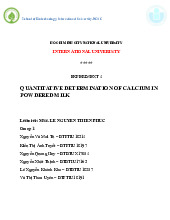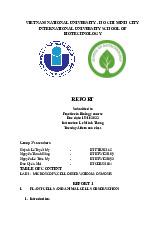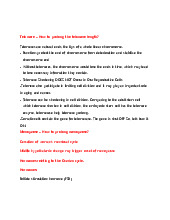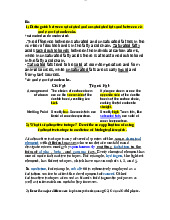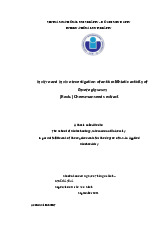

Preview text:
lOMoARcPSD|364 906 32
Ti Application Note No. T- 3 4 Title:
Hydrofluoric and nitric acid in etching baths Summary:
Determination of hydrofluoric and nitric acid in etching baths by potentiometric titration. a)
Determination of the total acid content using the combined
Sbelectrode and NaOH as titrant. b)
Determination of hydrofluoric acid using the F ISE and La(NO3)3 as titrant.
The concentration of nitric acid is then determined by calculation. Sample: Two different etching baths Sample Preparation: none Instruments and Accessories:
702, 716, 736, 751 or 785 Titrino or 796 Titroprocessor,
6.0421.100 combined Sb electrode,
6.0502.150 F ISE and 6.0726.107 reference electrode Analysis:
a) Determination of total free acid
Pipet 1.00 mL sample into a plastic beaker and dilute with dist. water
to approx. 25 mL, then titrate with c(NaOH) = 1 mol/L.
The first equivalence point of the titration curve corresponds to the
total free acid, the second EP to the dissolved heavy metal ions contained in the sample.
b) Determination of hydrofluoric acid
Pipet 1.00 mL sample into a plastic beaker and dilute with dist. water
to approx. 40 mL. Add approx. 1 g sodium acetate, adjust the pH of
the solution to 6.0 by adding NaOH and titrate with c[La(NO3)3] = 0.1 mol/L. Calculation:
a) mol/L total free acid = RS 1 = EP1 * C01 * C02 / C00
EP1 = titrant consumption in mL
C00 = 1.00 (sample size in mL)
C01 = 1 (concentration of the titrant in mol/L) C02 = titer of the titrant T-34/2 Calculation:
b) mol/L HF = RS2 = EP1 * C03 * C04 * C05 / C00 mol/L HNO3 = RS1 RS2
EP1 = titrant consumption in mL
C00 = 1.00 (sample size in mL)
C03 = 0.1 (concentration of the titrant in mol/L) C04 = titer of the titrant
C05 = 3 (stoichiometric factor: 1 La3+ reacts with 3 F ) lOMoARcPSD|364 906 32 Remarks:
In solutions containing an excess of HNO3 all fluoride is present as HF. Results:
Sample A: AVG(5) = 0.217 – 0.005 mol/L HF
AVG(5) = 1.731 – 0.024 mol/L HNO3
Sample B: AVG(5) = 3.871 – 0.029 mol/L HF
AVG(5) = 1.660 – 0.026 mol/L HNO3 T-34/2
Document Outline
- T-34/2
- T-34/2 (1)
